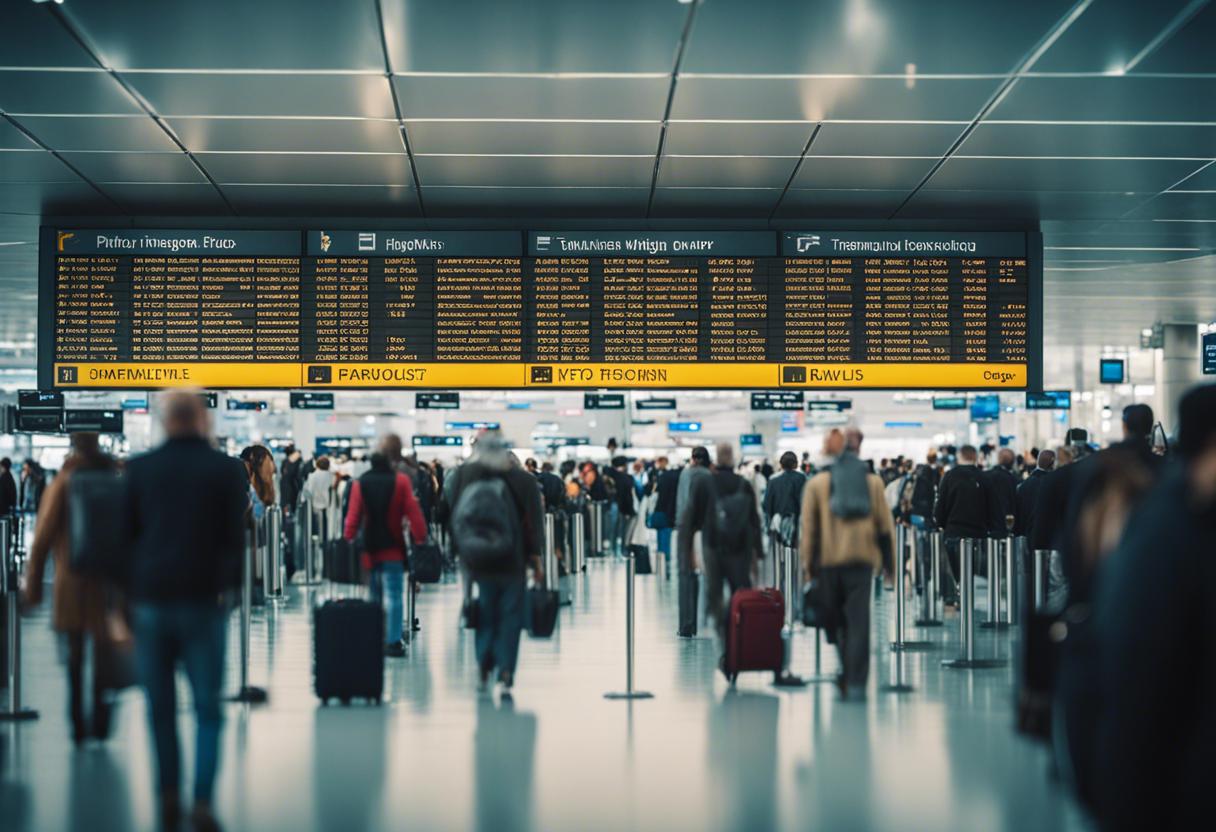Last weekend, I was scheduled to partake in a close friend’s wedding in Belfast, an event I’d been anticipating for some time. I had everything meticulously planned: fly from London to Belfast on Saturday around 6pm and arrive in plenty of time for the noon wedding the following day. This schedule would have given ample time for important preparatory tasks such as putting on my false tan and raiding my mother’s collection for superior accessories to the ones I had packed. I had even pre-booked my transportation to ensure a relaxed, civilised journey, free of the usual pre-dawn hustle.
However, my serenity was abruptly shattered on the preceding Friday when I received a voice note from yet another old friend. They mentioned a worldwide IT collapse that was wreaking havoc in airports, potentially causing our flights to get cancelled. Their flight was due to depart on Friday, and they appeared quite concerned. Initially, I was oblivious to their alarm and even found it slightly amusing, suspecting an overreaction. I subsequently looked up the issue and was taken aback to learn that a system update gone wrong by CrowdStrike, a global IT security firm, had caused payment and software disruptions in airports and hospitals worldwide, leading to hundreds of flight cancellations.
While I felt for my friend, I optimistically assumed the situation would be remedied by Saturday. In retrospect, I ponder who I imagined would manage this fix — perhaps some invisible group of exhaustion-proof ‘adults’ ready to ensure that everything went according to my plans. By lunchtime, my friend’s flight had been cancelled. I naively reassured them about finding an alternative flight, ignorant of the ripple effect this IT failure had caused — flights to Belfast became a rare commodity, with no available seats. I initally thought that the problem couldn’t possibly persist beyond a day, but reality soon belied my optimism.
Saturday witnessed us all confined in an airport waiting area where we lingered for a few hours, styled like a detaining pen. I was compelled to relinquish my beverage on the assertion that take-off would soon be underway. Subsequently, however, the flight was postponed numerous times and ultimately cancelled without the slightest acknowledgment.
In attempt to rectify the situation, I set about seeking alternatives on my computer. There was a wedding I had to attend and I was confident there had to be a plausible solution. My investigation swiftly led to the conclusion that there was an absence of flights from London to Belfast until roughly 4pm the following day, and each costing more than £600. I also explored other destinations only to discover a similar outcome. Opting for a train or a ferry proved fruitless as well. My mother discovered a budget-friendly flight option from Manchester the next day and proposed to reserve it. I examined whether I could reach Manchester from London in time, but again, there were no trains. The situation seemed implausible and I continued to hunt relentlessly, even contemplating non-existent flight routes.
The detained crowd started to display displeasure and squabble, casting about to place the culpability on someone. Even though we were demanded to depart, there was a shared sentiment that if we stayed put patiently, the abandoned flight might potentially be reinstated. If we voiced our discontent vehemently, it was possible.
Preceding the flight cancellation, the airport had been its typical disagreeable self with petty rows occurring frequently. It is a place invariably fraught with tension due to the highly charged atmosphere. The anticipation and thrill that precede any holiday combined with the potential for immense letdown if aspects go haywire, sabotaging the holiday plans, contribute to the ominous feel. The mild humiliation of going through security – decanting shampoo and conditioner into minute bottles, holding one’s belt and shoes – and the perpetual fear of being chastised or penalised for infringing one of countless, often pointless regulations further heighten the tension.
A couple of years back, I found myself stuck behind a bunch of lads heading off for a holiday, all queued for the security check. They all had no option but to relinquish their huge bottles of Paco Rabanne aftershave. They attempted to negotiate with the security controller, despairing over the financial loss. The group started to throw around different figures for the value of the bottles – 90, 130, 160 pounds. But the controller remained stern. One lad stoically proclaimed, “You know this isn’t fair,” while staring the controller down as the bottles were confiscated.
This incident epitomises the baseline aggravation that occurs amongst holiday-goers seeking a stress-free time with friends. But I suspect this makes up just a small fraction of the airport’s total throughput. The rest consists of family feuds, couples trying to salvage their failing relationships, obligatory overpriced hen getaways that nobody really enjoys and, likely, a man nervously trying to hide an engagement ring in his carry-on.
Over time, I’ve witnessed countless quarrels at the airport. In the past, I’ve assumed all were to do with finances. Isn’t that what usually sparks fights? But recently, I realised it’s more about the tension between the inflexible “system” and reality. This system rigidly insists that our Paco Rabanne be less than 100ml and that our luggage fits into the outrageously small cage. This regulation is enforced so inconsistently that it’s tempting to take a risk, yet a half-empty plane gives no guarantees. The system assures a smooth, ultra-convenient service, a promise that the realities of IT failures and human mistakes can struggle to maintain.
Rachel Connolly, a Belfast-based author, published her first book named Lazy City, last year.

